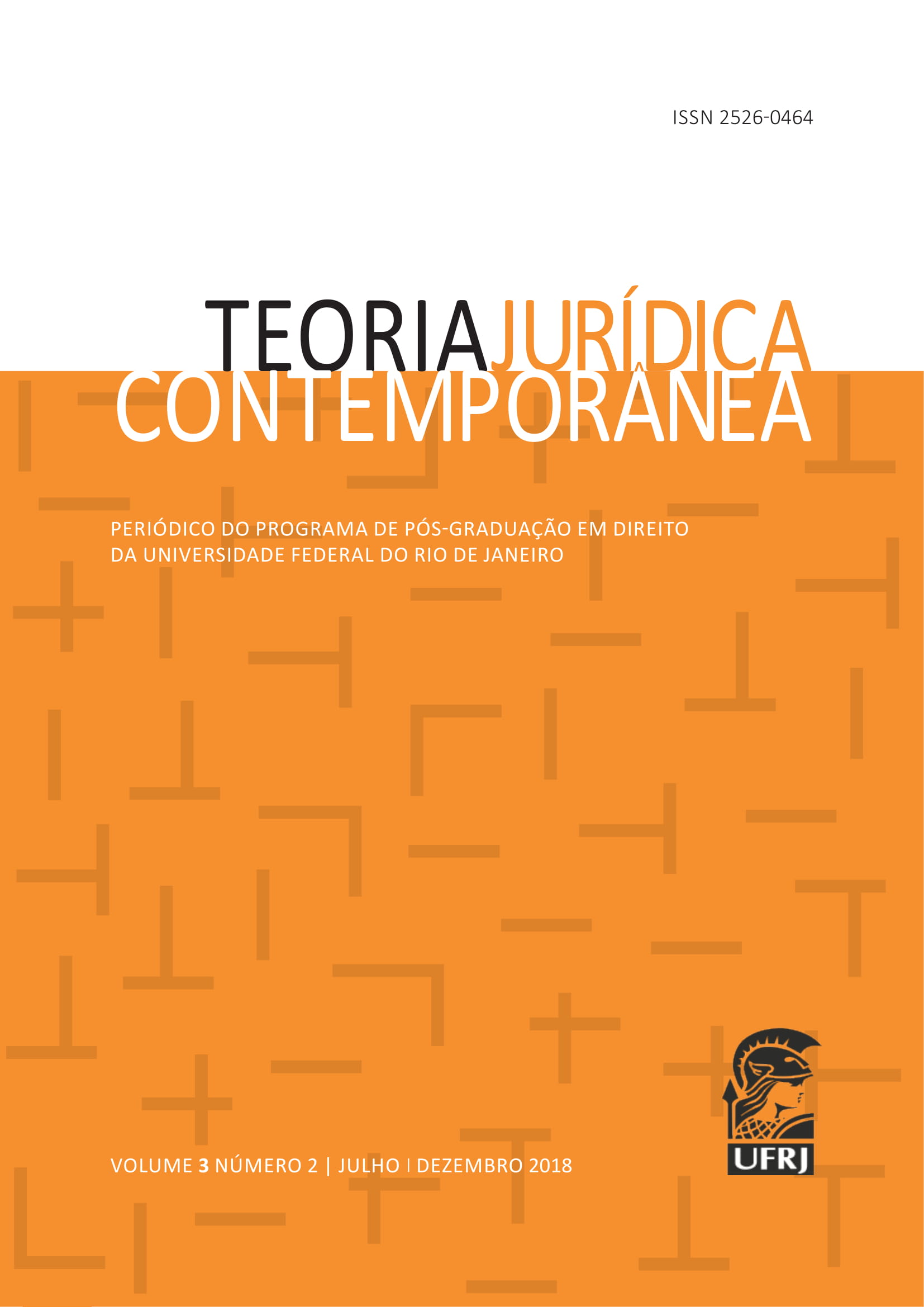Five Challenges for Theories of Law
DOI:
https://doi.org/10.21875/tjc.v3i2.19655Keywords:
Grounding, Supervenience, Law as factAbstract
RESUMO:
Neste artigo, enuncio cinco desafios intuitivos a serem enfrentados por uma teoria do direito. Na sequência, argumento que a ideia tipicamente positivista de que as atribuições jurídicas possam estar assentadas exclusivamente em fatos descritivos parece conflitar com três deles. Concluo, assim, que a despeito de tanto o interpretativismo quanto o descritivismo serem nalguma medida teorias contraintuitivas, é sobre o segundo que recai um maior ônus argumentativo.
ABSTRACT:
In this paper, I introduce five intuitive challenges that should be dealt with by theories of law. Then, I argue that the typically positivist idea that the legal ascriptions of a given legal system may be grounded exclusively on descriptive facts seems to conflict with three of those challenges. I conclude that in spite of the fact that both interpretivism and descriptivism are counterintuitive theories about law, it is the latter that has a greater argumentative burden.
References
BENNETT, K. Making Things Up. Oxford: Oxford University Press, 2017.
BROZEK, B.; ROTOLO, A.; STELMACH, J. (ed.). Supervenience and Normativity. Switzerland: Springer, 2017. DICKSON, J. Evaluation and Legal Theory. Oxford: Hart, 2001.
DWORKIN, R. Law’s Empire. Cambridge, MA: The Belknap Press of Harvard University Press, 1986.
GREENBERG, M. How facts make law. Legal Theory, Cambrige, n. 10, 2004, p. 157–98.
JACKSON, F. From Metaphysics to Ethics: A Defense of Conceptual Analysis. New York: Oxford University Press, 1998.
JACKSON, F. 2017. In Defense of Reductionism in Ethics. In: SINGER, P. (ed.). Does Anything Really Matter? Essays on Parfit on Objectivity. Oxford: Oxford University Press, 2017, p. 195–211.
HART, H. L. A. The Concept of Law. Oxford: Clarendon Press, 1994.
KIM, J. Postscripts on Supervenience. In Supervenience and Mind: Selected Philosophical Essays. Cambridge: Cambridge University Press, 1993, p. 161-171.
LIMA, F. On the-Law Property Ascriptions to the Facts. Ratio Juris: An International Journal of Jurisprudence and Philosophy of Law, v. 31, n. 2, 2018, p. 231-50.
PLUNKET, D. A Positive Route For Explaining How Facts Make Law. Legal Theory, n.18, 2012, p. 139-207.
RAZ, J. Kelsen’s Theory of the Basic Norm. American Journal of Jurisprudence, v.19, n. 1, 1974, p. 94-111.
RAZ, J. Between Authority and Interpretation: On the Theory of Law and Practical Reason. Oxford: Oxford University Press, 2009.
ROSEN, G. Metaphysical Dependence: Grounding and Reduction. In: HALE, B. HOFFMAN, A (ed.). Modality: Metaphysics, Logic, and Epistemology. New York: Oxford University Press, 2010, p.109-136.
SCHAUER, F. Law as a Malleable Artifact. In: BURAZIN, L. HIMMA. K. ROVERSI. C (ed.). Law as an Artifact. Oxford: Oxford university Press, 2018, p. 29-43.
SHAPIRO, S. J. The “Hart-Dworkin” Debate: A Short Guide for the Perplexed. University of Michigan Public Law and Legal Theory Working Paper, n. 77, 2007. Disponível em: https://doi. org/10.2139/ssrn.968657.
SHAPIRO, S. J. What Is Law (and Why Should We Care)? In: Legality. Cambridge, MA: The Belknap Press, 2011.
TAMANAHA, B. Necessary and Universal Truths about Law? Ratio Juris: An International Journal of Jurisprudence and Philosophy of Law, v. 30, n. 1, 2017, p. 3-24.
TROGDON, K. An Introduction to Grounding. In: Varieties of Dependence. In: HOELTJE, M., SCHNIEDER, B. STEINBERG, A. (ed.). Philosophia Verlag, 2013, p. 97-122.
Downloads
Published
Issue
Section
License
The authors who publish in this journal agree with the following terms:
1. The authors maintain the copyright and grant the journal the right of first publication, with the work simultaneously licensed under the Creative Commons Attribution License that allows the sharing of the work with recognition of authorship and initial publication in this journal.
2. Authors are allowed to assume additional contracts separately, for non-exclusive distribution of the version of the work published in this journal (e.g., publishing in an institutional repository or as a book chapter), with acknowledgment of authorship and initial publication in this journal.
3. Authors are allowed and encouraged to publish and distribute their work online (e.g., in institutional repositories or as a personal page) at any point before or during the editorial process, as this may generate productive changes, as well as increase the impact and citation of the published work (See The Effect of Open Access).

This work is licensed under a Creative Commons Attribution-ShareAlike 3.0 Brazil License.

